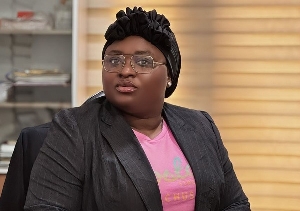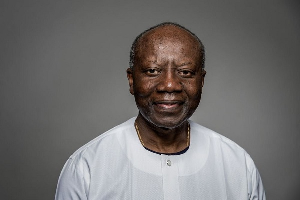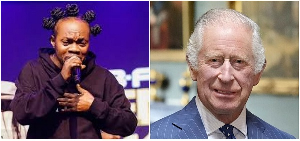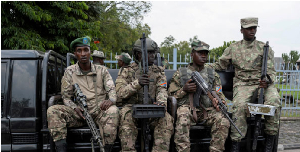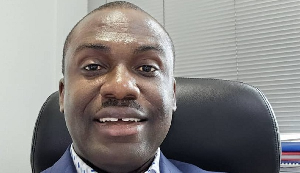If you are already fuming with anger over my description of Ghana there is no need for that. It will not change the fact that Ghana currently fits into the biblical description of hell – a scorching hot place, filthy and dangerously polluted, packed with criminals, wicked and merciless people, liars, thieves, hypocrites, greedy and selfish people, self-centred and self-righteous people, seriously rotten society full of rude and arrogant people, nation wreckers, hero worshipers and blind followers, poisonous snakes, tribal bigots and anarchists, the list is endless. That is the true picture of Ghana today if anyone dares to face it.
I love my country, no one can claim to love Ghana more than I do. I do not take delight in painting gloomy picture of her. I have had the opportunity to visit about 4 continents and I am convinced that God gave Ghana and Africa a fair share of everything we need to enjoy our existence here. There should be very little reason for any of us to migrate anywhere – certainly not in search of greener pastures. The reality on the ground is however different and I will not describe it because anyone who is able to read this write-up knows better.
Ghana was once a promising young beautiful country with garden cities. The people have attained independence and poised to fly high on the wings of freedom and justice. She commanded the attention of the whole world. All that one needed was to flash his or her Ghanaian passport and doors swung open anywhere in the world. Our cities and towns were planned and well laid out. The trains and buses ran efficiently and punctually. There was self-awareness and strong identity anchored by the rich and powerful culture transmitted through our local languages which were effectively used alongside the - adopted, indirectly imposed or borrowed - English language. That was when Ghana could be likened to heaven on Earth.
Indeed, Rome was not built in a day, it was built bit-by-bit everyday over a long period of time. The opposite is the case in Ghana; we have been tearing her apart bit-by-bit everyday over the past 57 years. One may take solace in the fact that there are other African countries far worse than Ghana is but that is rather an uncomfortable consolation.
The irony is that you occasionally hear the likes of Obasanjo of Nigeria blaming Africa’s woes on bad leadership. Our own Jerry Rawlings is often heard preaching integrity and justice and attacking bad leadership in Africa after 19 years as an African leader with records of killing and poor management leaving his country still in third world status and seriously underdeveloped. I find that very bizarre, I don’t know what you make of it.
We may need to take stock and track how we got here, how we ended up in this mess, not for the purpose of blaming anyone - because we have only ourselves to blame – but for what it is worth we may begin to change . My view is that we have had horrible leadership which has corrupted all of us over a long period of time in order to have their way. As a society we are rapidly losing the moral grounds to stand, speak out and act against corruption because all of us, one way or the other, have soiled ourselves. I will visit this point later but for now let’s do some quick stock taking.
Dr. Nkrumah had great vision but got the implementation wrong. He went about chasing an unrealistic dream at the neglect of his duties in Ghana and in the process a lot of atrocities were committed against people. Dr. Nkrumah wanted to remain in power to pursue a broader continental agenda and as such gloss over the corruption of his appointees in exchange for their unflinching support. There was hero worshipping, blind following, sycophancy, all of which contributed to bring him down. He failed to build a sustainable Ghana, the vision he had in his mind at the dawn of independence was lost in translation or transmission. The reality was that by 1966 the country was bankrupt and many of the factories he had put up lay idle. I can understand how you feel at this point if Nkrumah is your hero – he is a true hero - but it does not change the truth of his failure. The very people who called themselves die hard Nkrumaists were those who killed the man’s dream and turned around to blame Danquah and his followers. If Ghana was well managed Danquah-Busia movement would have been seriously unpopular. A lot of the children and grandchildren of the Nkrumaists today would not see eye to eye with anyone from the Danquah Busia stock because the poison fed to them by their parents is still potent and they will sure feed their unborn seeds similar dose.
After Nkrumah the downward spiral continued. Ghana had become very chaotic and everything was depleting at an accelerated pace – our natural resources, our positive cultural practices, linguistics, customs and respect for nature. Our institutions had started dying and subsequent leaderships could not inject the right amount of energy needed to revive them. Chieftaincy was a sad casualty under Nkrumah’s dictatorial regime and got worse subsequently with chiefs who placed their personal comforts above that of their people.
The transitional military government under Afrifa gave way to democratic rule but that lasted for only 2 years under Busia. Acheampong emerged in 1972 and his reason for the coup de’tat was that Busia had removed certain incentives that the military heads were enjoying. Ghana under the 6 years reign of General Acheampon recorded some attempts to develop but there was no real intent and strategy for industrialisation as was seen under Dr. Nkrumah. The management of the country was not based on any future orientation; we lived on seasonal bases. Acheampong built schools when more schools were needed, built new settlements like Dansoman because we needed accommodation and then he introduced operation feed yourself. The agricultural policy resulted in food surplus - all meant to feed ourselves and not necessarily aimed at agro-industrialisation. Ghana was doing alright but not sustainable so when the economy started tottering attempt was made to remove Acheampong. The good old general and his comrades clearly were far more interested in ‘love making’ than killing people and as such let Rawlings off the hook when he made his first move. We were told that Acheampong’s effort was not good enough and that corruption was thriving under his leadership. He was overthrown and the years following that were nothing but complete chaos.
In 1981 a group of young Ghanaian military personnel and civilians took over the country from Limann who was democratically elected to lead the country. This group was led by Jerry John Rawlings, P V Obeng, Tsatsu Tsikata, Kojo Tsikata, Totobi Kwakye, Kwesi Botchwey, the Ahwoi Brothers, Ohene Agyekum, Kofi Awoonor and many others. What is worth noting is the age of these people at the time they took over the country. Kofi Awoonor might have been the oldest, the rest were very young people. Although not all of them were part of the planning and execution of the coup de’tat that toppled Limann, this little fact made no difference as most of them joined the new era from day one.
With the exception of Rawlings who later admitted to knowing nothing about economics and only knew when his belly was empty, the rest of them touted their economic, managerial and legal prowess. The followers (most of whom had very little education and no assets beside the shirts covering their backs) believed that these young men had the right antidote to the problems of Ghana. They were young men and women between 28 to 35 years who claimed to have understood the problems of our society better and had come to set things right once and for all.
The coup makers had executed or murdered Acheampong, Afrifa, High Court Judges and several others accused of corruption. The new youngsters in town would stop at nothing to crush anyone they perceived to be corrupt. Some of them vowed to end the economic hegemony of certain tribes – especially the Ashantis - and true to their words they pounced on them and destroyed their businesses, seized their assets, jailed some of them, chased out a good number of them and killed those who were not lucky to escape. Piece by piece they tore down both state and private companies and brought to an end all industrial efforts in the country.
Ashanti Goldfields, the jewel in the crown of Ghana and the richest goldmine on the surface of Earth, was placed in the hands of a 36 year old intelligent and vibrant Ghanaian and it was run into bankruptcy. The goldmine was pawned off, with individuals walking away filthy rich. They could not even build a gold museum to show that this country was once called Gold Coast but went straight into businesses in other African countries whilst graduates queue for no jobs in Ghana.
Some of these young experimentalists set up companies to buy and export cocoa and there were instances when a ship load of cocoa could get lost at sea. They also could not even build a cocoa museum to show tourists that we are a leading producer of that rich crop let alone to set up a factory to manufacture chocolates that could compete with those from Switzerland, Belgium and England.
At the end of 19 years rule Ghana was still a third world country with serious energy crisis, no potable water in most parts of the country, declined standards in education, high inflation, weak financial sector with less than 10 mainstream banks and several rural banks, poor infrastructure and high indebtedness. The youth who took over the country have grown into old men and women and have amassed wealth but the living condition of most Ghanaians remained deplorable - little drizzle and part of Accra was flooded, notably Alajo.
J A Kufuor took over in January 2001 and sought to straighten the management of the country. His government focused on the financial administration of the country. Indeed any country with a backward banking system has a backward economy and Ghana in 19 years under J J Rawlings had very little business to do with banking save confiscating citizens’ fifty cedi currency notes and not accounting for them. The Kufuor administration worked hard to bring down inflation, strengthen the financial sector to make credit available to the private sector for investment. There was an attempt – although not sufficient - to strengthen state institutions such as customs, police and lands commission. They also tackled infrastructure the same way that previous governments have done – as and when able - schools were built, attempts made to provide affordable housing as Dr. Nkrumah, Acheampong and Rawlings did through State Housing Corporation and SSNIT. Roads were constructed, buses and trains reintroduced. Agriculture was also given some attention recording the highest growth in cocoa production. Efforts were made to tackle energy crisis and also to supply water to our homes although full national requirement of electricity and water were not totally met.
The 8 years of president Kufuor brought economic relief to Ghanaians mainly due to the prudent administration of the economy but Ghana was still not developed. The NPP party argued that John Kufuor, like John the Baptist, only came to prepare the way and that Nana Addo Danquah Akufo Addo was coming after him to lift off the country to greater heights and transform it physically and economically – politicians call it ‘ECONOMIC TAKE OFF’. This campaign did not fly and Ghanaians having tasted a good life in a long while wanted more and felt Uncle Atta – as president John Evans Fiifi Atta Mills was affectionately called – with his “I care for you” campaign would care more. He also promised more cash in our pockets and a better Ghana. After all Better Ghana is what we wanted. Maybe Ghanaians did not understand the word ‘Transformation’ - it was too vague for us. Uncle Atta was dangling Better Ghana in one hand and Cash in another whilst Nana Addo had Transformation in one hand and BIG (Believe In Ghana) in the other. Uncle Atta won.
The return of the NDC to power brought back the 1981 gang. P V Obeng became senior advisor to President Mills, Ato Ahwoi was rumoured to be the most powerful man in Ghana, Kofi Awoonor was a Godfather and the rest of them played different roles behind the scene. The frontline was packed with young incompetent appointees with sharp tongues. Mr. Jeremiah John Rawlings refers to the young appointees as ‘mediocre’ and ‘babies with sharp teeth’ and his old comrades as; “old evil dwarves” – of course he maintains his righteousness.
Prof. Mills did not do anything remarkable besides claiming to have achieved single digit inflation. The period under Mills was filled with scandals and no serious economic or infrastructural development. On the contrary projects started by the Kufuor government were frozen. There was fraudulent judgement debts payment, phantom employment figures, vice president Mahama put under investigation into alleged corrupt dealings, the issue of the president’s poor health, insults from young inexperienced ministerial appointees, bloated cost and numbers of schools under trees or “trees under schools” constructed and so on.
The end of Uncle Atta’s reign came rather tragically when the good old calm and ‘gentle feller’ gave up the ghost in June 2012. Mr. John Dramani Mahama took over and told Ghanaians that he was the head of the economic management team as vice president and in fact the main person in charge of the country even when Prof. Mills was alive because President Mills gave him the powers to do most of the work - perhaps due to his poor health.
Nana Addo came back with Transformation in one hand and Free Education in the other whilst this time John Dramani Mahama held Better Ghana in one hand and “Edey bee keke” in another. I do not know for sure the exact choice Ghanaians made this time. There was allegation of criminals hiding at Dzowulu intercepting election results and changing them in favour of John Mahama, besides the issue of fiddling with the pink sheets. In the end, you and I were not there neither were the supreme court judges. The judges are not magicians and do not claim to have one of those prophetic powers and insights so they listened like we all did, and being the only ones whose judgement count, a lot of you disagreed but we all had to accept in the end that John Dramani Mahama must remain the president.
Nearly two years is gone by under President Dramani Mahama and the country is officially declared “in crisis”. Whatever that means or whatever the government may want us to see in that term does not matter, the bottom line is that our economy is in bad shape. We are highly indebted and the cedi is unstable. Everyone is crying out and we do not know when the pinching will stop for the crying to stop. Government is unable to meet statutory payments to allow district assemblies and even parliament to function effectively, infrastructure development is down, standards are falling in education not to mention huge arrears in salary payments and headaches in NHIS, GETFUND, energy, water, poor sanitation resulting in deteriorating public health. The Cedi is competing with Usain Bolt although “the Dollar is appreciating the cedi”, and the national debt has ballooned from Ghc 9 billion to Ghc 50 billion in 6 years.
Ghana has become hell for most Ghanaians. After 57 years of independence we cannot boast of constant flow of water to our hospitals and the filth and stench in Accra is enough to make a person pass out. I was wondering why we are quiet and seemingly unable to hit the road and demand accountability from the managers of the country. The conclusion I came to was sad and scary. The Ghanaian society has lost the moral grounds to demand accountability. We have thrown away our values and have become very cheap if not worthless. We are easily bought and sold with money stolen from us. Most of us have become thieves and or criminal accomplices and unable to make a case when we are being robbed. Consider the following:
1. Politicians steal from the national coffers and offer you Ghc 10, give out 4x4 vehicles to compromise Chiefs, leaders of the National Peace Council, Christian Council, various Union leaders, the judiciary and so on.
2. The police collects Ghc 1 from drivers, the official fees for processes at the DVLA are not known; custom officers are busy extorting money and building houses; Lands Commission becomes a sin city; COCOBOD is infested with ‘akate and swollen shoot’, civil servants are stealing and failing to work, some university lecturers are in the business of “chew and pour” and ‘sex for grade’. University students steal from the internet and pass them on as their work; fake pastors outnumber true pastors. We have become lazy and expect God to do everything for us by miracle. And you may add to the list.
So tell me, how do we question Okudzato Ablakwa over houses and petrol stations he might have acquired in 6 years? It may be true that his combined salaries and allowances over the 6 years as government appointee may not be enough to pay for a 3 bedroom house at Amasaman let alone East Legon or the USA but what right do we as society have to question him when most of us are equally corrupt - save the quantum of wealth we are able to access? What right have we to point accusing fingers when as employees of the state, we collect, indeed demand bribes, before carrying out a simple administrative work for which we receive a monthly salary? The average young Ghanaian looking for employment speaks the same language:
“Chaley that place money dey ooo, money dey there! If you get chance for there, that one you go koraa. Oh some my paddy way me and am finish Legon, in uncle push am for there, right now if you see him, he dey make am. he dey zuk Range Rover 2014 and he dey build his own house self. Nection dey there waa. Chaley Ghana here money dey oo, people dey make am. But its whom you know. Right now my prayer be say I go get some place like that.”
There is already an intention to steal before we even apply and secure a job. I wonder if God grants the answer to such prayers. I believe in God and know that he works miracles but only in the life of truthful and hardworking people. God will bless the works of our hands if only we put our hands to good work. As it stands now, I think we are at ‘Aglo’ for our own influence in national politics and not for Jesus. I hope to get the opportunity in my life time to write another article with the title ‘GHANA: FROM HELL TO HEAVEN’
Prempeh Forson
Prempeh.forson@gmail.com
Opinions of Sunday, 8 June 2014
Columnist: Forson, Prempeh




